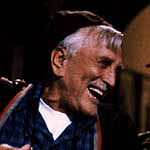
Kirk Douglas: "Torah is greatest", Sep. 15th, 1997

Kirk Douglas views the Torah as `greatest screenplay ever', by Tom Tugend
When Kirk Douglas started to study the Torah in his mid-70s, the actor in him immediately found a professional relevance.
``The Torah is the greatest screenplay ever written,'' he observed. ``It has passion, incest, murder, adultery - really everything.''
It has been a long road back to his Jewish roots for the veteran of 82 movies who began life as Issur Danielovitch, the son of poor, illiterate Russian-Jewish immigrants, became college wrestler Isadore (Izzy) Demsky and then actor Kirk Douglas.
His trademark dimpled chin jutting out -- for his first movie role, Paramount honchos wanted to obliterate the million-dollar dimple through plastic surgery - Douglas reminisced about his life and faith during a 75-minute interview in his art-filled, but relatively modest, Beverly Hills home.
But this did not seem like a conversation with an 80-year-old man with an implanted pacemaker, sorely tested in the past few years by severe injuries sustained in a helicopter crash and, more recently, by a stroke.
Having passed his biblically allotted life span of 70, he is looking forward to his second Bar Mitzvah in Israel at age 83.
His fifth and sixth books, published by Simon & Schuster, are coming out this month.
In ``Climbing the Mountain: My Search for Meaning,'' Douglas narrates, with both earnestness and humor, his long, spiritual journey back to Judaism and the Torah.
``The Broken Mirror,'' a Holocaust-themed book for children, similarly touches on the struggle of a young boy, an orphan of the Shoah, who denies his Jewishness and eventually finds his way back.
Douglas is planning for his first collaboration with his oldest son, Michael, the movie ``A Song for David,'' centering on the relationship between a father who rediscovers his Judaism in old age and his workaholic son.
Waiting in the wings, ``if Hashem wills it,'' he said, is another joint film project, tentatively titled ``Josiah's Cannon,'' also on a Jewish theme.
Then there is his carefully selected collection of modern, not yet fashionable, painters, and pet charitable projects: Children's playgrounds for poor neighborhoods in Los Angeles and Israel; an Alzheimer's unit at a hospital for people retired from show business; AIDS and homeless projects; the Access Theater for the Handicapped; and a $2 million theater opposite the Western Wall, where worshipers will watch films on the history of Judaism.
Douglas said he has a date at the White House on Dec. 23, together with Israeli Prime Minister Benjamin Netanyahu, to watch President Clinton light the first Chanukah candle, which will also symbolize the beginning of Israel's 50th anniversary year.
Douglas hopes to revisit Israel, where he has made three films, next year.
Unfulfilled, as yet, is his ambition to greet the sunrise at the top of Mount Sinai.
Finally, there is his family. His countless love affairs and one- night stands - with movie queens and casual pickups alike - well behind him, Douglas speaks often and proudly of his 43-year marriage to his second wife, Anne, and of his four sons from his two marriages - Joel, Peter and Eric, in addition to Michael.
Despite their father's dire warning, all four sons work in the film industry as actors and/or producers.
For most of his life, Douglas has been an indifferent Jew at best. At one point in his college career, though a popular student body president and champion wrestler, he said he tried to pass himself off as a half-Jew.
He dates his return to Jewish observance and full Jewish identifi- cation to a 1991 collision between his helicopter and a light stunt plane that killed two young men.
The crash compressed his spine by three inches, and while lying in a hospital bed with excruciating back pain, he started pondering the meaning of his survival and his life.
``I came to believe that I was spared because I had not yet come to terms with my Judaism, that I had never come to grips with what it means to be Jewish,'' Douglas reflected.
He embarked on a course of Torah studies with two young Orthodox rabbis, David Aaron of the Isralight Institute in Jerusalem, and Nachum Braverman of Aish HaTorah in Los Angeles.
However, Douglas, like many American Jews, picks and chooses among religious rules and injunctions to fit his personal needs.
``I attend High Holy Days services, mainly at the Synagogue for the Performing Arts, and have fasted on Yom Kippur all my life. I now light candles in my home every Shabbat,'' he said.
``But I think of myself as a secular Jew,'' he added, noting that he rides in cars on Shabbat and doesn't keep kosher.
``But it would be very difficult for me to go into a restaurant and order pork.''
The Jewishness of his four sons falls into another, increasingly common, niche. Both Douglas' former and current wives are non-Jews, so none of his sons, by Jewish law, is Jewish or was raised as such.
``I have never followed the commandment to teach your children,'' Douglas said. ``But my sons always knew I was a Jew, even way before I studied the Torah.''
His own increasing connection to Judaism ``has impressed my sons,'' he said, adding, ``Michael, I think, is very Jewish. He feels as a Jew and he is ready to help Jewish causes.''
Douglas's most enduring relationship has been with his second wife, Anne, German-born, Belgian-raised and a multilinguist.
During the interview, she observes that being married to Kirk ``is like sitting in a beautiful garden, next to a volcano.'' The interviewer interjects that the volcano was probably not erupting as much as it used to.
``Oh, I don't know about that,'' Douglas, who will turn 81 on Dec. 9, said. ``I like to think there are still a few eruptions left.''